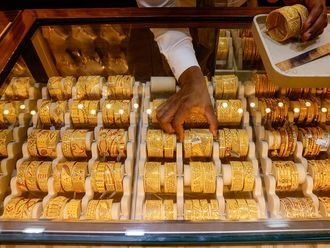London: Gold rose to its highest level in almost a month on Tuesday as record-high oil prices fuelled fears of accelerating inflation, but a drop in global demand for the precious metal caused some concern.
Demand for gold for jewellery, investment and other uses, fell 16 per cent compared with a year ago to 701 tonnes in the first quarter of 2008 - the lowest quarterly figure in five years - as bullion hit a record above $1,000 an ounce, the World Gold Council said in a report.
Spot gold hit a high of $919.60 an ounce, its highest level since April 23, up from $905.00/$906.40 an ounce late in New York on Monday.
"Obviously the worries about inflation continue and are getting worse," said Daniel Hynes, metals analyst at Merrill Lynch.
Outlook
"We think there will be more bad news coming out of the woodwork in terms of the global economic picture, which should help the gold market. I think consumers have to catch up a bit with where we are now."
Gold holdings in the world's largest exchange-traded funds (ETF) for bullion, StreetTRACKS Gold Shares, were unchanged at 583.93 tonnes after a sharp drop last week - still down from a record of 663.83 tonnes in mid-March.
Gold has lost more than 12 per cent in value since spiking to a record high of $1,030.80 on March 17, on profit taking and a recovery in the US dollar against other currencies. But high oil prices, which raises fears of inflation, may offer support.
Gold futures for June delivery on the COMEX division of the New York Mercantile Exchange added $12.1 to $917.9 an ounce in electronic trading.
Currencies: Euro rises
The euro was higher in European trading after the US Labour Department's Producer Price Index reported that wholesale inflation increased by 0.2 per cent in April following a 1.1 per cent jump in March.
The euro bought $1.5646 in afternoon trading, above the $1.5516 in late New York trading on Monday. The pound traded at $1.9680 compared with $1.9482 late on Monday in New York. The dollar bought 103.70 yen compared with Monday's 105.26.
- AP












